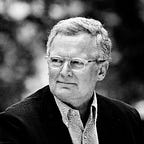How to scale up learning
Our chances of creating work for human beings in the new, demanding, post-industrial environment will be very limited if old and unjustified assumptions about what people can or can’t do are not examined.
If we continue to assume that some people are intelligent or creative, while most are not, and continue to see intelligence and creativity as fixed, personal possessions, the options for the needed large-scale systemic changes will be few.
If, on the other hand, we were to visit recent findings of neurosciences, relational psychology, and computational social science, we would see intelligence as something more fluid. Then a whole different set of opportunities would become visible. Perhaps a bigger problem than low-skilled people would be the low-skilled occupations we have created.
Belief systems are contagious. If, over an extended period of time, people are treated as if they are intelligent, they actually become more so. The opposite can also be true.
Success in life has been seen governed by two concepts: skills and effort; how bright you are and how hard you work. Recently, researchers have claimed that there is a third and decisive concept. It is the practice of lifelong curiosity and learning: “knowing what to do when you don’t know what to do” as Piaget put it.
The collective intelligence of our societies depends on the tools that augment human intelligence. We should welcome the fact that people today are smarter in large measure because they have invented and use smarter tools.
Making tools is what human beings have always done. The interactions between tools and human minds are so complex that it is very hard to try to draw a line between humans and technology.
As technology changes, people and what people do, are necessarily changed.
Neither is it a zero-sum game where the human brain is losing to technological intelligence, but as technology changes, people and what people do, are necessarily changed.
To benefit from technology, we need imagination. It means to be constantly looking for new human centric use cases for the new intelligent technologies and tools. It also means new services to augment human cognition: if you have a smartphone in your pocket, you should have an easy access to education in your pocket.
Smarter and smarter technologies surround us, but if we don’t want to learn the new practices and come up the new services that the new technologies like AI make possible, they might as well not be there. This is often not easy, because the challenge with new technologies is, what is called “functional fixedness”, our inability to see more than the most obvious use cases.
This was the case in the early days of the steam engine and this is the case in the early days of Artificial Intelligence today.
There is of course more to being intelligent than using the latest technologies; how we interact with others is a crucial element of how smart we are in practice. Intelligence is social and arises in communities and communication. The world has never been a more networked place, and yet schools and workplaces still focus on individuals. That needs to change.
Human behavior is learned in relations. Our brains are wired to notice and imitate others. Computational social science has proved that behavior can be caught like a disease merely by being exposed to other people. Perhaps you can catch intelligence from others the same way?
Learning and also non-learning can be found in communication. It is not that people are intelligent and then socially aware. Social intelligence is not a separate type of intelligence. All intelligence emerges from the efforts of the community.
Work starts from problems and learning starts from questions. Work is creating value and learning is creating knowledge. Both work and learning require the same things: interaction and engagement.
Scientists have discovered that learning is learnable. With the help of modern tools, we can create ways for very large numbers of people to become learners. But learning itself has changed, it is not first acquiring skills and then utilizing those skills at work. Post-industrial work is learning. It is figuring out how to solve a particular problem and then scaling up what has been learned— both with technology and with other people.
.
